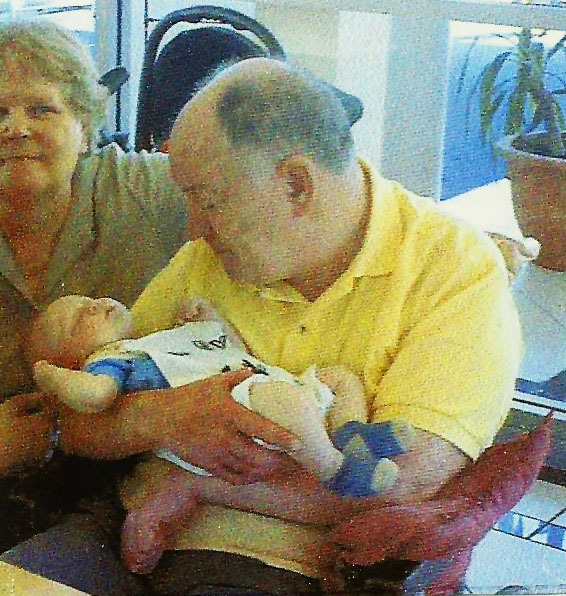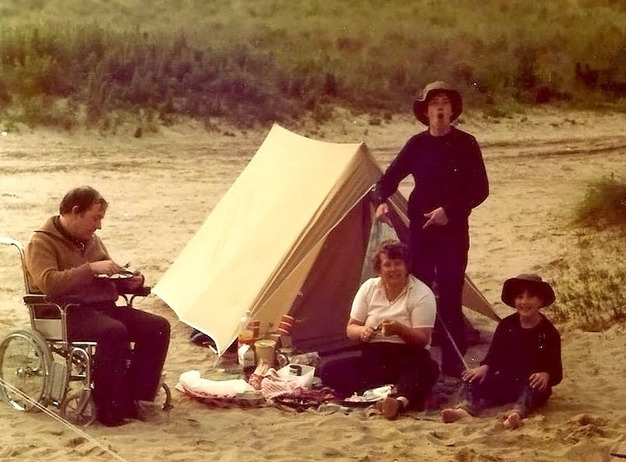Caring for someone with MS

My mum always used to say that it wasn't just Dad who had been diagnosed with MS - it was all of us.
In fact, I don't even remember a time when my life wasn't shaped by MS, right from my family's plan to emigrate to Australia with my brothers before I was born. But this had to be shelved when Mum was expecting me and Dad started displaying the early symptoms that would later be diagnosed as the onset of multiple sclerosis; the uneven walking and sometimes slurred speech that made some people even accuse him of being drunk.
When I was born in the 1970s, there was really no such thing as legal protection against disability discrimination. Dad was summarily sacked from his job and basically stayed home to bring me up, while my mum juggled three or four jobs to keep the family.

I was a real daddy's girl and his condition was just my normal. I thought everyone had to help their dads up when they'd fallen over and couldn't get up. Some of my earliest memories are of him bathing me in the kitchen sink on days he'd struggle to get up stairs. Later on, when he'd finally accepted he would need to use a wheelchair, I can remember sitting on his knee in our local town centre collecting donations for the MS Society.
By the time I was about 10, Dad needed much more support with everyday living, forcing us to relocate to somewhere more affordable and suitable for his needs. In a completely new area, I went to a new secondary school, where perhaps for the first time I felt our 'difference' as a family. I remember being the only kid who couldn't go on a particular school trip because we couldn't afford it, and I got into a fair few scraps because bullies would take the mickey and say cruel things about my dad being disabled.
It seemed there were so many places we couldn't go as a family, things we couldn't do, because there was no access or we couldn't get up the steps: it's one of the reasons I became and still am so passionate about disability rights and believe everyone should be able to access places, jobs, education, whatever their needs.
If you or one of your loved ones live with a long-term condition like MS, it seems to me that life becomes about fighting. My dad was a fighter and lived from his diagnosis in his 30s until he was in his 70s, very much retaining his sharp mind and often dark sense of humour. But getting the care and support he needed to be able to stay at home and the disability benefits he was entitled to could feel like an ongoing and exhausting battle.

My mum was his main carer for many years but sadly she was diagnosed with cancer in 2004 and died 10 months later. Dad's health deteriorated and he ended up in hospital, and later they wanted to move him to a nursing home, which he absolutely didn't want.
At the time, I was living a three and a half hour drive away and had a toddler and a newborn baby. We had to fight tooth and nail to get him home with a 24-hour care package, apart from at weekends, so me and my brothers took it in turns to cover that.
Eventually I felt I needed to move closer to home. As the stay-at-home parent, Dad had done everything for me when I was a little girl, so it felt kind of fitting that for the last 10 years of his life the roles were reversed and I was able to manage his care.
Even though I'd worked in a social care setting and knew the system, it could be a challenge. You have to learn to be an expert in your own care, or have someone in your corner, to navigate things. It's not right that you have to fight for everything - but that is the reality faced by families everywhere.
If you run out of fight, this is where you need advocacy and this is where the voluntary sector can come in.
As an organisation, I like to hope that LionHeart can help people in that position to move forward; whether that's legal or benefits advice, signposting, sometimes financial grants to help with equipment or adaptations, or simply somewhere to turn if you need to someone to talk to.
It's far more common for people to carry on working after a diagnosis now, there are government schemes such as access to work, which offer practical support to the employee and employer.
MS is a long-term condition, the symptoms are very personal to the individual and can not only change over time but can become more severe due to environmental stress, personal relationships, money worries, and concerns about being able to physically manage self care.
The very nature of the condition makes it a journey with lots of twists and turns.
My dad always said that he never wanted to feel like a burden and feeling and being in control of his own life kept him going and kept him strong. But it never hurts to let someone help you maintain that control. Going back to what my mum said, something like MS does affect the whole family so no matter whose diagnosis it is, why not let LionHeart help you all feel in control and keep that strength.
Debra Jumar is LionHeart's data and contracts manager. She joined LionHeart in 2020, after more than 25 years in social care and the charity sector, from supporting families in London's most deprived boroughs, to helping the Government to deliver Sure Start Children Centres nationally.

